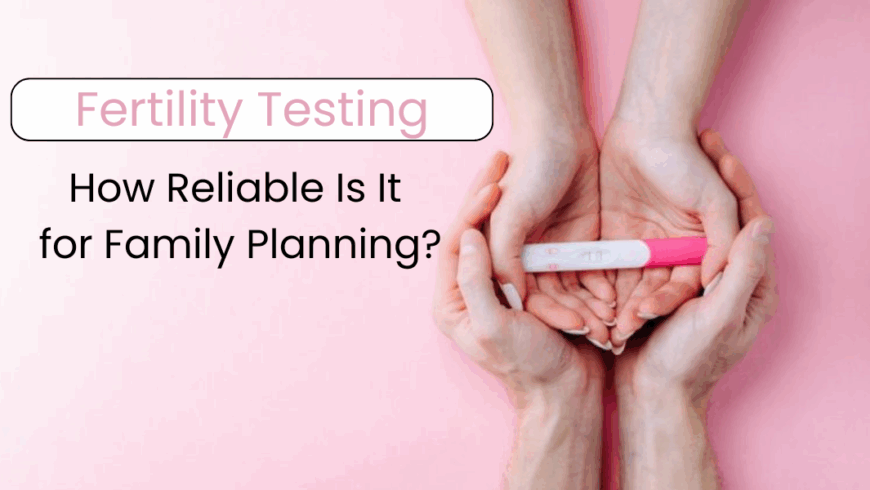Fertility Testing: How Reliable Is It for Family Planning?
Family planning is a critical step for couples looking to start a family, and understanding fertility is a key part of this process. Fertility testing helps identify potential barriers to conception and offers a clearer picture of reproductive health. But how reliable are these tests, and can they really help in planning a family? In this blog, we will explore different types of fertility tests, their accuracy, and how they can guide couples toward successful conception.
What Is Fertility Testing?
Fertility testing involves a series of medical assessments to determine a couple’s ability to conceive naturally. These tests are designed to evaluate factors in both men and women, as infertility can be attributed to either partner. For women, these tests focus on ovarian function, hormone levels, and overall reproductive health, while for men, they assess sperm health and viability.
Types of Fertility Tests for Women
Ovulation Tests:
Ovulation tests measure luteinizing hormone (LH) levels in a woman’s urine, signaling when ovulation is about to occur. Ovulation is crucial for conception, and knowing when it happens can improve the chances of getting pregnant. While ovulation tests are highly reliable, they do not guarantee pregnancy but help identify the most fertile days in a woman’s cycle.
Hormone Blood Tests:
Blood tests measure key hormones like follicle-stimulating hormone (FSH), estradiol, and anti-Müllerian hormone (AMH). These hormones provide insights into ovarian reserve (the quantity and quality of eggs) and overall reproductive health. For instance, AMH levels are often used to estimate how many eggs a woman has left, which is a reliable indicator for family planning. However, they cannot predict the quality of the eggs or whether conception will occur.
Ultrasound:
Pelvic ultrasounds allow doctors to visualize the ovaries and uterus, checking for issues such as cysts, fibroids, or abnormalities that could affect fertility. This test accurately diagnoses structural problems but does not measure egg quality or guarantee pregnancy.
Hysterosalpingography (HSG):
HSG is a specialized X-ray that examines the fallopian tubes and uterus to check for blockages or abnormalities. A blockage in the fallopian tubes can prevent sperm from reaching the egg, making this test important for evaluating female infertility. While the test is quite accurate for identifying physical issues, it does not address hormonal or ovarian problems.
Endometrial Biopsy
This procedure involves collecting a small tissue sample from the uterine lining to check for abnormalities that could affect embryo implantation. While it’s effective in identifying issues like endometriosis or chronic inflammation, this test is invasive and less commonly used compared to other fertility tests.
Fertility Testing for Men
Male infertility is responsible for approximately 40% of infertility cases. Testing often involves:
- Semen Analysis: This test evaluates sperm count, motility, and morphology to determine if sperm health is contributing to infertility.
- Hormone Tests: Blood tests for testosterone and other key hormones provide insights into sperm production and overall reproductive health.
How Reliable Are Fertility Tests?
Fertility tests are generally reliable in diagnosing potential issues with reproductive health. However, they do not guarantee a couple will or will not conceive. For example, ovulation tests can pinpoint fertile days, but even during peak fertility, there’s no guarantee of conception. Hormone tests and ultrasounds provide valuable insights but are only pieces of the puzzle.
Moreover, fertility is influenced by a range of factors, including age, lifestyle, and overall health. For women over 35, fertility naturally declines, and while tests like AMH levels provide useful information, they do not predict the exact timeline of a woman’s fertility.
Are Fertility Tests Useful for Family Planning?
Yes, fertility tests are useful for family planning, but they should be part of a broader approach that includes healthy lifestyle choices, regular medical consultations, and, when needed, medical treatments for infertility.
Fertility testing helps:
- Identify Issues Early: Early detection of fertility problems, such as blocked fallopian tubes, low sperm count, or poor ovarian reserve, allows for quicker intervention.
- Guide Treatment: Based on test results, doctors can recommend treatments such as fertility drugs, intrauterine insemination (IUI), or in vitro fertilization (IVF).
- Manage Expectations: For couples considering delaying pregnancy, tests like AMH can help gauge the remaining fertile years and provide a realistic timeline for family planning.
However, fertility tests cannot provide absolute answers. While they offer valuable insights, other factors—such as egg and sperm quality, general health, and timing—also play significant roles in conception.
When to Seek Professional Help?
If you’ve been trying to conceive for over a year (or six months if you’re over 35), it’s recommended to seek medical advice. A fertility specialist can conduct complete tests and offer tailored advice based on your specific situation. Female infertility can be treated with a range of interventions, depending on the underlying cause.
Fertility testing is a critical tool for couples planning a family. It provides reliable insights into both male and female fertility factors, allowing couples to make informed decisions about their reproductive health. However, it’s important to remember that while fertility tests are helpful, they do not guarantee pregnancy.
For those in need of professional guidance, Dr. Pallavi A. Mulay, an expert in female infertility treatment in Hadapsar at Dr. Mulay Superspeciality Hospital, offers personalized care to help couples achieve their dream of starting a family. Her expertise in diagnosing and treating female infertility ensures that every patient receives the best possible treatment plan.







